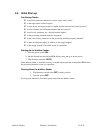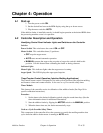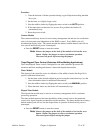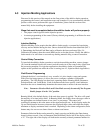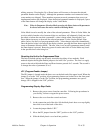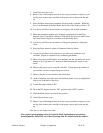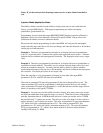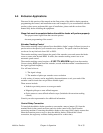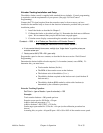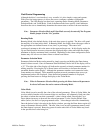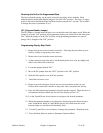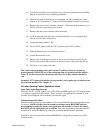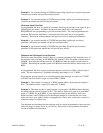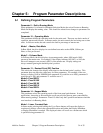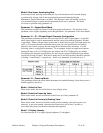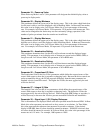
Additive Feeders Chapter 4: Operation 29 of 55
Extruder Tracking Installation and Setup
The additive feeder control is supplied with standard factory defaults. Control programming
is required to suit the requirements of your process (See page 24, Field Control
Programming).
Connect the TTL signal acquired from the extruder control or from a sensor you have
installed to the terminal strip as shown in the electrical schematics provided with your unit’s
installation packet.
1. Install the feeder as described in Chapter 3.
2. Calibrate the feeder as described on Page 18. Determine the feed rates at different
rpms. We recommend that you plot the feed rates on graph paper.
3. Calculate a new display constant taking the extruder screw signal into account.
Constant = 1000 x # of Pulses per Revolution of Extruder Screw ℵ
# of Pulses per Revolution of the Feeder Screw ℑ
ℵ
If not counted directly from screw, multiply by a “fudge factor” to get the pulses per
extruder screw rpm.
ℑ
Factory set at 843 (PPR x 28.1 gear ratio).
Program the control to the new constant, as described in the next section “Field Control
Programming.”
Determine the desired additive feeder setpoint (% of extruder (master) screw RPM). To
determine this, you must know:
• Total extruder feedrate (lbs./hr.).
• The RPM of the extruder screw at that feedrate.
• The letdown ratio of the additive (% or :).
• The additive feedrate required at that letdown ratio (total feedrate X
letdown ratio).
• The additive feedrate RPM needed to achieve this feedrate (as
determined by the calibration procedure).
Extruder Tracking Equation:
Set Point = (rpm of feeder / rpm of extruder) x 100
Example:
Total extruder feedrate = 500 pounds per hour
Extruder screw rpm for 500 lbs/hr = 50 rpm
Additive letdown percentage = 7%
Additive feedrate = 500 X 0.07 = 35 lbs./hr.
Feeder auger rpm needed for 35 lbs./hr. = 44 rpm (as the calibration procedure has
shown)
Assuming this, set point = 44 rpm/50 rpm x 100 = 88 or 88% of the extruder screw speed.



